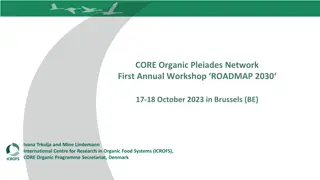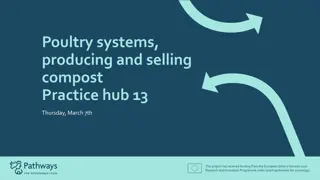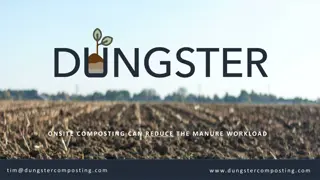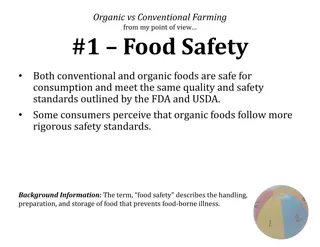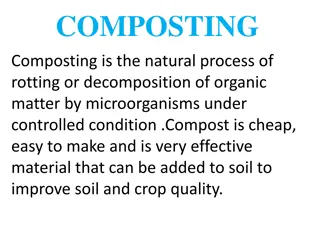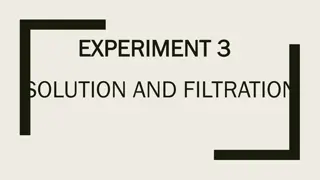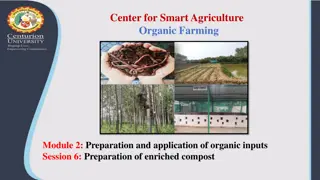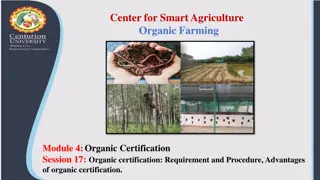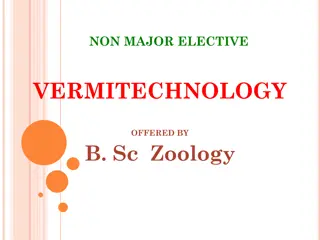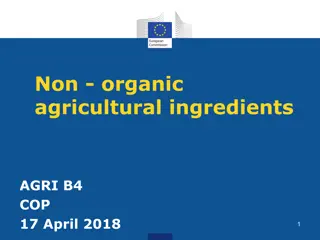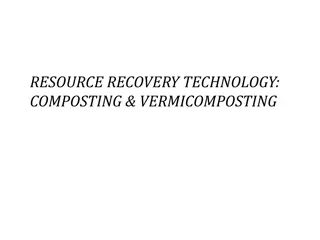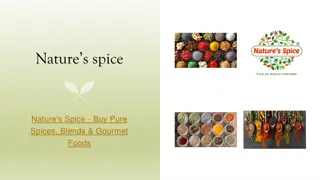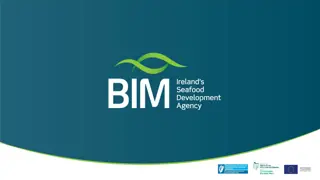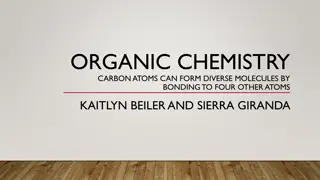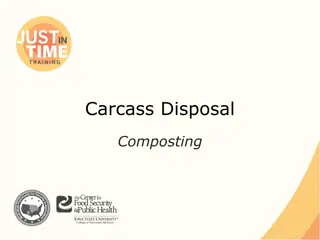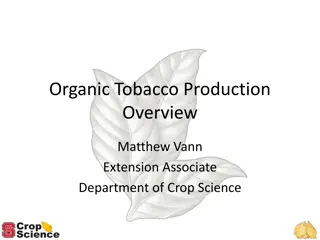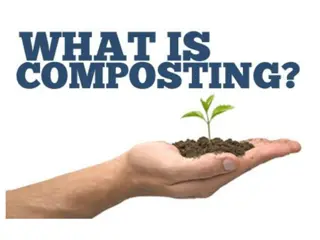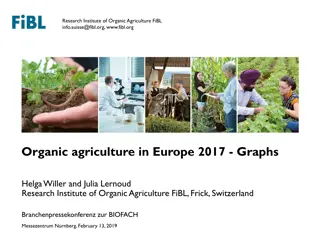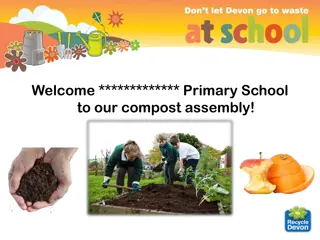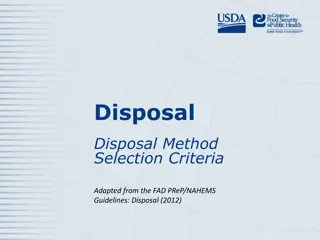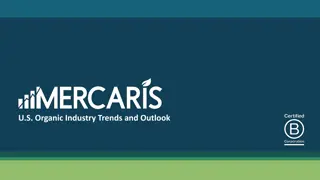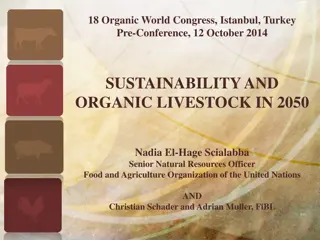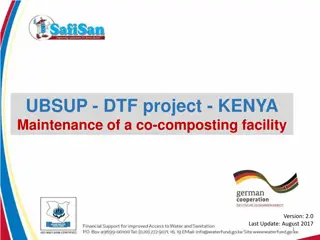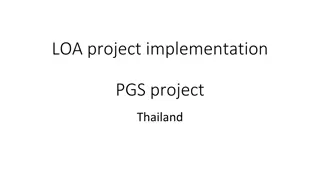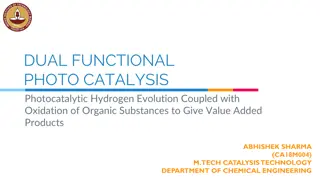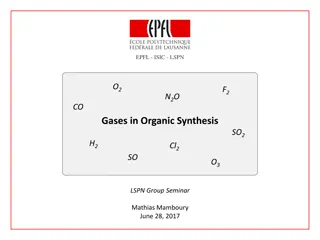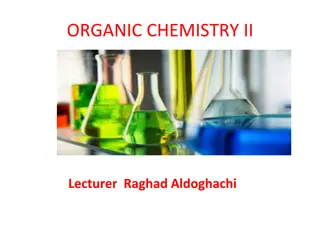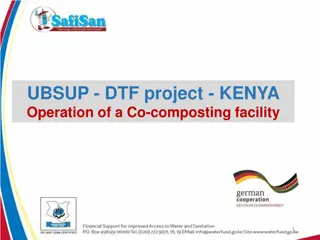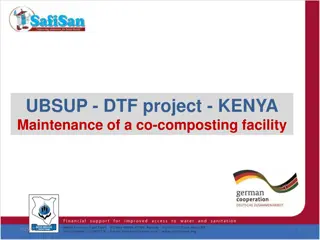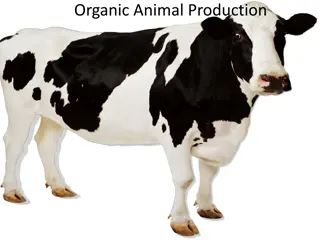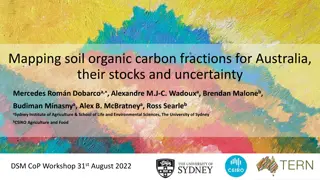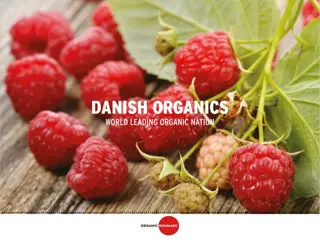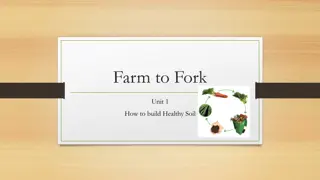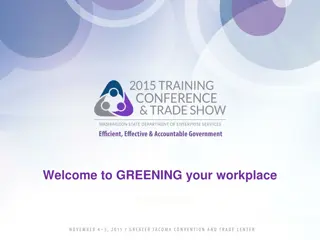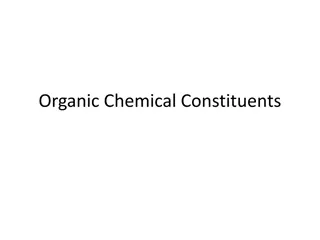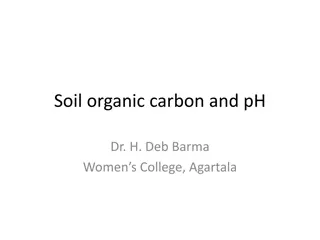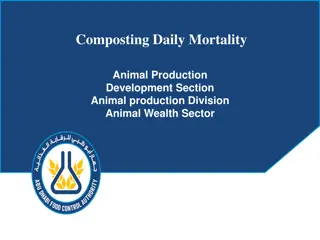Embracing the Zero Waste Program at California State University, Los Angeles
California State University, Los Angeles is committed to achieving zero waste by repurposing bins, piloting Bigbelly stations, and expanding composting efforts. The Zero Waste Program aims to minimize landfill waste by recycling and composting valuable resources, guided by ethical and sustainable pr
3 views • 13 slides
CORE Organic Pleiades Network First Annual Workshop Roadmap 2030 - Event Recap
The CORE Organic Pleiades Network held its first annual workshop in Brussels, focusing on organic research and innovation in the European agri-food sector. The event discussed HEU partnerships, national/regional action plans, research funding, and more. CORE Organic aims to enhance knowledge and inn
1 views • 37 slides
Farmer Cooperative's Innovative Poultry Composting Project
Farmer cooperative Fertil Eveil is leading an innovative project focused on producing and sharing compost from plant-based litter within a Practice Hub environment. With multiple composting platforms established in France, the cooperative aims to improve nutrient management and assess the impact of
3 views • 6 slides
Efficient On-Site Composting Methods for Reducing Manure Workload
On-site composting can significantly reduce the workload associated with managing manure on small farms. By following principles of economy of effort and the O.H.I.O principle (Only Handle It Once), manual loading methods and efficient composting techniques can transform manure into valuable compost
6 views • 19 slides
Organic vs Conventional Farming: An Overview
In the debate between organic and conventional farming, both methods have their pros and cons. While organic foods are perceived to follow stricter safety standards, both types meet FDA and USDA regulations. They offer similar nutritional value, but organic farming tends to have lower efficiency due
0 views • 6 slides
Effective Methods of Composting for Sustainable Soil Enrichment
Composting is a natural process of organic matter decomposition, beneficial for improving soil quality. The Bangalore Method, Construction of Pit, Filling the Pit, Modified Bangalore Method, and Padegaon Method are efficient techniques used to produce high-quality compost for agricultural purposes.
0 views • 13 slides
Separation and Purification of Organic Compounds: Methods and Techniques
The separation and purification of organic compounds are essential processes to obtain pure products, as impurities and side reactions can affect the quality of the compounds. Methods such as solution and filtration, crystallization, distillation, extraction, sublimation, and chromatography are comm
8 views • 15 slides
Enhancing Compost Quality for Organic Farming: Phosphorous-Enriched Compost Preparation
Composting is a natural process crucial for organic farming. Enriched compost improves nutrient supply to crops. Learn how to prepare phosphorous-enriched compost using organic wastes, bio-inoculants, and rock phosphate. Follow a method involving layering organic materials, cow dung, and rock phosph
4 views • 8 slides
Organic Certification and NPOP in India
Organic certification is crucial for ensuring the quality and authenticity of organic products. This involves adhering to strict production standards and undergoing periodic inspections. In India, the National Programme on Organic Production (NPOP) plays a significant role in certifying organic comm
1 views • 10 slides
Vermitechnology and Composting: Sustainable Waste Management Solutions
Solid waste management is crucial in the face of increasing urbanization. Composting and vermitechnology offer natural and effective ways to treat organic waste, with earthworms playing a key role in bioconversion processes. Utilizing organic wastes like animal manure, crop residues, and food waste,
1 views • 12 slides
Concerns and Recommendations on Non-Organic Agricultural Ingredients
Various Member States express concerns about the inclusion of new non-organic agricultural ingredients in Regulation 889/2008 Annex IX, emphasizing the need to maintain the integrity of organic production. Suggestions include keeping the list as short as possible, searching for organic alternatives,
1 views • 19 slides
Guide to Operating a Co-composting Facility in Kenya
Explore the operations of a co-composting facility in Kenya through detailed images and descriptions. Learn about the areas within the co-composting shed, materials required, composition of windrows, and the process of turning windrows in the co-composting project. Discover the ideal combinations of
1 views • 20 slides
Composting and Vermicomposting Technology
Composting and vermicomposting are controlled decomposition processes of organic materials, with aerobic microbes breaking down the matter in the presence of oxygen. Aerobic composting produces stable humus and helps eliminate pathogens and weed seeds. The processes involve microbial respiration, ga
1 views • 29 slides
organic chana masala
Nature\u2019s Spices Organic Chana Masala is a meticulously curated blend of organic spices, crafted to elevate the flavor of chickpea dishes. Sourced from certified organic farms, our masala blend is free from additives and artificial ingredients, e
2 views • 6 slides
Overview of Global Farmed Salmon and Organic Production
The data showcases the production figures for global farmed salmon across various countries, with Norway leading the production, followed by Chile, Scotland, and others. Additionally, insights into the growing organic salmon production, vulnerabilities in the sector, and details on organic mussels p
2 views • 9 slides
Organic Chemistry: Carbon Atoms and Molecular Diversity
In organic chemistry, carbon atoms can form diverse molecules by bonding to four other atoms, leading to molecular complexity and diversity. The versatile nature of carbon allows for the formation of various carbon skeletons, contributing to the vast array of organic compounds. Hydrocarbons, consist
0 views • 12 slides
Effective Carcass Disposal Through Composting
Composting carcasses with organic materials can accelerate biological decomposition, destroy pathogens, and produce a nutrient-rich humus. Proper carbon-to-nitrogen ratios, moisture levels, oxygen maintenance, and temperature control are crucial for the efficiency of the composting process. Mixing a
0 views • 21 slides
Organic chicken masala
Organic Chicken Masala is a meticulously blended combination of premium organic spices, designed to elevate the taste and aroma of chicken dishes. Sourced from certified organic farms, our masala guarantees purity and is free from chemicals and pesti
1 views • 6 slides
Guide to Organic Tobacco Production Process
Understand the process of organic tobacco production including obtaining a contract, certifying land, inspections, maintaining certification, selling leaf, and transitioning from conventional to organic production. Get insights on organic certification through USDA-National Organic Program, required
1 views • 18 slides
The Fundamentals of Composting
Compost is organic matter decomposed into a valuable fertilizer and soil amendment. The process involves aerobic decomposition of waste material, turning it into nutrient-rich humus. Composting requires a mix of organic matter, water, air, and proper carbon:nitrogen ratio for efficient breakdown. Th
0 views • 21 slides
Overview of Organic Agriculture in Europe 2017
Europe has seen a significant increase in organic farmland and retail sales in 2017. With 2.9% of Europe's farmland being organic, totaling 14.6 million hectares, countries like Spain, Italy, and France lead in organic farming. In terms of retail sales, Denmark and Switzerland stand out with high pe
2 views • 9 slides
Engaging Compost Assembly for Primary School Students
Explore the interactive compost assembly at a primary school, covering topics like the importance of composting, what can be composted, the process of composting, and ways for everyone to participate. The assembly features engaging visuals and a compost chant, encouraging students to take action in
0 views • 9 slides
Guidelines for Animal Disposal Methods
Environmental and biosecurity guidelines recommend various disposal methods such as composting, rendering, permitted landfill, unlined burial, fixed-facility incineration, and open-air burning. Each method has specific selection criteria and considerations to minimize risks to the environment and bi
0 views • 17 slides
Insights into U.S. Organic Industry Trends and Outlook
The U.S. organic industry is experiencing positive consumer demand growth, with organic food sales reaching $56 billion in 2020. Despite a decline in organic dairy sales, the overall organic acreage growth remains strong. The market faces challenges such as the impact of COVID-19, the need for produ
1 views • 12 slides
Sustainability and Organic Livestock Modeling for Global Food Security
The research presented at the 18th Organic World Congress in Istanbul delves into the Sustainability and Organic Livestock (SOL-m) modeling approach developed by FAO and FiBL. The study aims to explore the potential impacts of global conversion to organic livestock production by 2050 on food securit
2 views • 25 slides
Guidelines for Maintaining a Co-Composting Facility in Kenya
Learn about the moisture and temperature control requirements for managing a co-composting facility in Kenya. Discover troubleshooting tips for addressing issues such as odors, climatic influences, and vectors. Follow step-by-step instructions to monitor temperature levels and ensure efficient compo
0 views • 8 slides
Promoting Participatory Guarantee Systems (PGS) for Small Scale Organic Farming in Thailand
The project aims to strengthen organic agriculture communities in Thailand through the establishment of Participatory Guarantee Systems (PGS) as an alternative to third-party certification. PGS advocates for market and government recognition, focusing on quality assurance, trust, and knowledge excha
0 views • 13 slides
Dual-Functional Photo Catalysis: Hydrogen Evolution & Organic Oxidation
The research explores dual-functional photo catalysis, combining hydrogen evolution with the oxidation of organic substances to produce value-added products. It focuses on utilizing photoelectricity to create electrons for hydrogen production and organic molecule oxidation. The study investigates th
1 views • 14 slides
Role of Gases in Organic Synthesis: A Comprehensive Overview
The presentation delves into the significance of gases in organic synthesis at standard temperature and pressure, focusing on reactions with atom incorporation for the synthesis of useful organic molecules. It covers various gases such as H2, O2, O3, CO, NO, N2O, SO2, Cl2, F2, discussing their advan
1 views • 23 slides
Organic Chemistry II Lecturer Raghad Aldoghachi - Laboratory Safety Rules and Distillation Techniques
Explore the world of organic chemistry with Lecturer Raghad Aldoghachi through laboratory safety rules emphasizing following instructions, chemical safety, and appropriate attire. Learn about hazard symbols, organic compound studies, distillation as a separation method, purification of liquid organi
0 views • 17 slides
Guide to Co-composting Facilities Operation in Kenya and Benin
Explore the user's guide for operating a co-composting facility in Kenya and Benin, covering areas such as material storage, composition of windrows, and the co-composting process. Learn about the ideal layers for windrows, turning schedules, and creating the perfect balance of nitrogen and carbon f
0 views • 22 slides
Maintenance and Troubleshooting Guidelines for Co-composting Facility in Kenya
Learn about moisture control, temperature management, and troubleshooting tips for a co-composting facility in Kenya. Ensure proper moisture content between 40% to 60%, monitor temperature changes weekly, and troubleshoot odor and climatic influences effectively. Follow user guides and protocols for
0 views • 8 slides
Organic Animal Production in the US: Insights and Statistics
Organic animal production in the US involves raising livestock and poultry through natural practices without antibiotics or hormones. Animals are fed organic feed and have access to outdoor spaces to mimic natural behavior. Statistically, over 5 million acres of land are certified for organic animal
3 views • 19 slides
Mapping Soil Organic Carbon Fractions in Australia: Stocks and Uncertainty
This study by Mercedes Román Dobarco et al. focuses on mapping soil organic carbon fractions across Australia, including mineral-associated organic carbon, particulate organic carbon, and pyrogenic organic carbon. The research involves prediction of soil organic carbon fractions using spectral libr
0 views • 17 slides
The Danish Model: Driving Organic Breakthrough & Market Growth
The Danish Model showcases the political and market mobilization behind the organic breakthrough in Denmark. Organic Denmark focuses on driving market growth through political policy, consumer motivation, innovation on farms, and strategic work with retailers and food services. The country has exper
0 views • 39 slides
Building Healthy Soil Through Composting: A Practical Guide
Learn how to build healthy soil through composting in this comprehensive guide. From creating compost piles to understanding the decomposition process, discover the benefits of composting for reducing waste and improving soil quality.
0 views • 4 slides
Greening Your Workplace: Why and How to Implement Organic Composting and Recycling
There are compelling reasons to go green at your workplace, such as preserving natural resources, setting a positive example for employees, improving efficiency, and creating a healthier work environment. Discover the benefits of installing organic composting and recycling systems in your facility a
0 views • 21 slides
Organic Chemical Constituents
A variety of organic compounds can impact water quality, leading to taste, odor, and toxicity issues. Organic substances are composed of carbon, hydrogen, nitrogen, and oxygen, and can originate from natural sources, human activities, or chemical reactions during disinfection. Differentiating organi
0 views • 16 slides
Soil organic carbon and pH
Soil organic carbon, a measurable component of soil organic matter, plays a crucial role in soil acidity control, nutrient cycling, and pollutant degradation. Learn about the differences between soil organic carbon and soil organic matter, the composition of soil organic matter, and the distinct fra
0 views • 15 slides
Efficient Composting for Daily Animal Mortality Disposal
Composting is a recommended method for disposing of daily animal mortality, offering a natural biological decomposition process under specific conditions. By combining carbon and nitrogen sources with water and oxygen, this method promotes rapid decay, addressing environmental concerns associated wi
0 views • 14 slides

